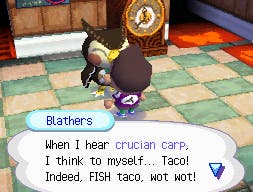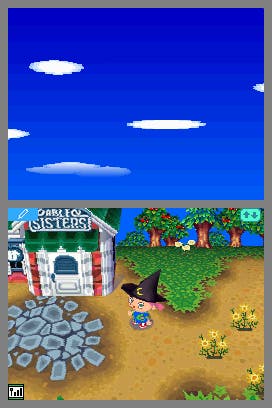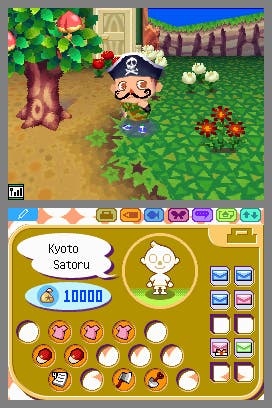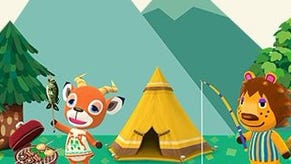Animal Crossing: Wild World
Wild, weird and rather wonderful.
It's not every day that an angry pig called Rasher demands to know when your birthday is. Or that a taxi-driving turtle asks you out to dinner. Or that a raccoon informs him you're in a huge amount of debt and must work in his shop to pay it off.
Unless, of course, you're living in the truly wild world of Animal Crossing. The first AC was a hit on GameCube, even if it did take years to make it over to Europe, and now Nintendo is bringing us a DS version - in a rather more timely fashion, thankfully.
In fact, Animal Crossing: Wild World is just a few months away from completion now, which meant that we got the chance to go hands-on with the game at the Nintendo Europe Summit recently - and we're happy to report that AC appears to be making the transition to Nintendo's handheld very smoothly.
For those who aren't familiar with the first game, Animal Crossing puts you in a cute-looking town inhabited by a load of cute-looking animals with enormous heads and wildly differing personalities. Your basic goal is to earn cash by running errands, working in shops and the like, and then using that cash to pay off your mortgage, spruce up your apartment and, er, buy stuff.
But don't make the mistake of assuming that this is just The Sims for kids - yes, it's a simple enough game in principle, and yes, it features colours so bright your eyes go all swimmy, but Animal Crossing has a unique charm and character all of its own.
Turtle power

The good news is that, from what we've seen so far, that charm and character is very much present in Wild World, right from the start. The game begins with you in the back of a taxi belonging to the aforementioned turtle, Kapp'n, who's driving you to your new home.
Kapp'n asks your name and gender (which are then stored) and, if you're super hot like us, asks you out to dinner (we said no, but he didn't seem too offended). Next thing you know you're at the town hall and being welcomed by the clerk, Pelly, who invites you to go and take a look around.
So this is your new home town. The bottom screen displays your character, who is facing you, and uses a front-on perspective, so that the earth rolls under your feet as you move - giving the impression that you're perched on a giant ball. The top screen, at least while you're just wandering about, displays nothing but blue skies populated with fluffy clouds - now that's our kind of game.
To help you navigate, there's a handy map showing the location of your house and various other important buildings. You access this by tapping an icon in the top right of the touch screen to open a menu, which also helps you keep track of any items you've collected, clothes in your wardrobe, friends you've accumulated and so on. Or you can just skip the menu and press X for the map, helpfully.
Wandering around town is great fun and easy to do - you just use the stylus to guide your character around. If you're some tiresome old stick-in-the-mud you can always use the D-pad instead, however.
One of the first things you'll come across is the town noticeboard, which is always full of information - some useful, such as notifications of when the next firework display will take place, and some random, such as the "Message of the Week." The week we were in town, this read: "Tired of studying? Stop! Then go work as a carnie." (And they say games are a bad influence on children.) You can post your own messages on the board, too.
Meet and greet

Much of your time in AC:WW will be spent interacting with other characters - so be prepared to spend a lot of time scrolling through text. But this isn't the chore it might be, since the characters you meet really do have differing personalities, the game gives you a wide choice of answers to throw back at them, and they'll frequently come out with something that's very useful to know or so stupidly random you'll get a laugh out of it anyway.
Not all of the characters are welcoming and friendly (like the aforementioned pig, for example) and some of them are downright dislikeable - such as loan shark/raccoon Tom Nook. He pops up to inform you that you owe a sackload of money on the mortgage for your new home: 19,800 bells, to be exact.
This is rather disconcerting, and not least because you're wondering what he's going to do with that many bells anyway. Having spent a perfectly pleasant ten minutes talking to turtles, wandering along tree-lined streets and gazing at the lovely blue skies, being informed that you have a huge mortgage is like being clanged in the face with a titanium brick. You mean, we've only just begun to explore this wondrous new world, and we've had lots of fun so far, and yet we're already in a load of debt and we're going to spend the rest of our lives working to pay it off? It's a bit like leaving university, basically.
But wouldn't you know it, Tom Nook has a solution: you can work off the debt by taking a part-time job at his shop. So off you go to pick up your new uniform and begin your life of state-endorsed slavery until you've paid off the mortgage - at which point you can buy a bigger house, and get yourself into debt all over again.
At least the work isn't too taxing - your first task is to plant trees and flowers around Tom Nook's shop, which is fun. Plus you do of course get time off and you don't have to wear that stupid uniform all the time; there's also the option to buy new outfits and even design your own clothes.
It's little additions like this which add to the overall charm of Wild World, and remind you that it's been put together with real care and attention to detail. We especially like the fact that you can write your own theme tune, using the stylus to drag coloured notes shaped like teddy bears' heads up and down the musical scale. It's the small things that matter.
Making connections

What with all the people to meet, the events to attend, the tasks to complete and of course the mortgage to pay off, there's plenty to be getting on with. But if thanks to the fact that the game works with Nintendo's Wi-Fi Connection service, you can also go online to visit your friends' home towns and vice versa.
It works like this: when visiting another town, you'll be greeted at the entrance gates by Officer Copper, who will ask you to input the Friend code of the person you're going to see. Each DS has its own unique Friend code, and just as with Mario Kart, these can only be swapped offline for security reasons. You must also go to your own town gates and inform the officer that visitors are welcome before they can come and see you.
One of the best things about this is that every town is different - they're randomly generated, so you'll never see exactly the same layout twice. Also, you can do anything in someone else's town that you would do in your own, such as talking to characters, buying and selling items and so on. You can also send messages to your friend via a Pictochat-style system, and swap items which might not be available in your area.
You can even go mental and start cutting down all the trees and destroying all the flower beds, if that's what makes you happy. But be warned, all you vandals, ruffians and hoodies: it's possible to send unwanted visitors packing and block their Friend code so they can't come back.
Up to four people can visit a town at once, and you don't even have to go online if you don't want to - there's also a local area Wi-Fi option. Or you can share your game cartridge with other people and get yourself some roommates to help pay off the mortgage - again, there's a maximum occupancy of four. Rather neatly, your roommates will appear to be snoring contentedly in their beds whenever you're playing the game, and vice versa.
It's little touches like this which suggest that Animal Crossing: Wild World is no lazy port - along with all the features of the GameCube version, there are plenty of new elements unique to the DS, and many of these are specially designed to make excellent use of the handheld's capabilities. But the most exciting feature has to be the Wi-Fi Connection mode - it'll be great to communicate with real people as well as angry pigs with giant heads. Can't wait.




.png?width=291&height=164&fit=crop&quality=80&format=jpg&auto=webp)




.jpg?width=291&height=164&fit=crop&quality=80&format=jpg&auto=webp)
